Robalo R227 Performance
Brief Summary
A younger sibling has been created to occupy the lower end of the Robalo Dual Console lineup, right alongside the R227 and R247. This new R207 shares the same mission of creating a dual console bowrider that successfully crosses over between fishing a family utility boat. She's got a roomy layout with plenty of features to successfully accomplish both of her missions.
Key Features
- 13 gallon livewell with L.E.D. lighting and blue gelcoat finish
- Built-in cockpit coolers behind helm seats with drains
- Dura-Life Max seating upholstery vinyl
- Encapsulated reserve flotation
- Full wrap cockpit coaming bolsters
- Raw water wash down with hose connector
- Transom storage to access rigging compartment
- Self bailing cockpit drains
- Storage - under bow seating and starboard helm
Test Results
| RPM | MPH | Knots | GPH | MPG | NMPG | STAT. MILE | NM | dBa |
|---|---|---|---|---|---|---|---|---|
| 580 | 3 | 2.6 | 0.47 | 6.28 | 5.46 | 339 | 295 | 57 |
| 1000 | 4.7 | 4 | 0.89 | 5.25 | 4.57 | 284 | 247 | 65 |
| 1500 | 6.5 | 5.7 | 1.23 | 5.28 | 4.6 | 285 | 248 | 68 |
| 2000 | 8 | 6.9 | 2.05 | 3.88 | 3.37 | 209 | 182 | 69 |
| 2500 | 9.8 | 8.5 | 3.6 | 2.72 | 2.37 | 147 | 128 | 76 |
| 3000 | 16.8 | 14.6 | 4.19 | 4.01 | 3.49 | 217 | 188 | 77 |
| 3500 | 24.5 | 21.3 | 5.6 | 4.38 | 3.8 | 236 | 205 | 81 |
| 4000 | 27.7 | 24.1 | 7.65 | 3.62 | 3.15 | 196 | 170 | 83 |
| 4500 | 32.9 | 28.6 | 9.7 | 3.39 | 2.94 | 183 | 159 | 84 |
| 5000 | 36.7 | 31.9 | 12.65 | 2.9 | 2.53 | 157 | 136 | 86 |
| 5500 | 40.5 | 35.2 | 13.3 | 3.04 | 2.64 | 164 | 143 | 90 |
| 6000 | 42.2 | 36.7 | 16 | 2.63 | 2.29 | 142 | 124 | 90 |
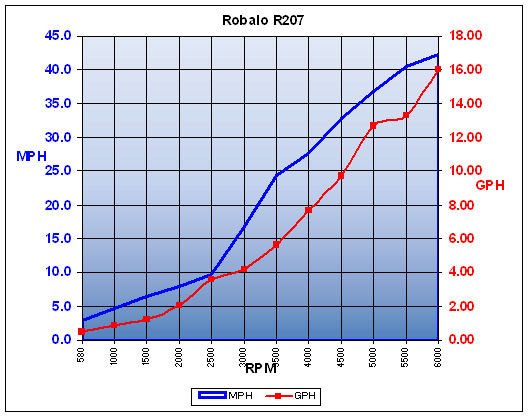
Specifications
| Length Overall | 20' 7'' / 6.55 m |
|---|---|
| Beam | 8' 4'' 2.54 m |
| Dry Weight | 3,500 lbs. 1,587 kg |
| Tested Weight | 4,100 lbs. 1,860 kg |
| Draft | 30'' 86 cm |
| Deadrise/Transom | 18-deg. |
| Max Headroom | open |
| Bridge Clearance | 8' 4'' 2.54 m (w/ tower) |
| Fuel Capacity | 60 gal. 227 L |
| Water Capacity | N/A |
| Total Weight | 4,100 lbs. 1,860 kg |
Price
See the price by becoming
a BoatTEST member.
Acceleration Times & Conditions
| Time to Plane | 3.2 sec. |
|---|---|
| 0 to 30 | 8.0 sec. |
| Ratio | N/A |
| Props | 19'' Saltwater Series 2 |
| Load | 2 persons, 1/2 fuel, no water, 50 lbs.of gear |
| Climate | 86 deg.; 92% humidity; wind: 0-5 mph; seas: calm |
Engine Options
| Tested Engine | 1 x 150-hp Yamaha 4-stroke |
|---|---|
| Std. Power | Not Available |
| Opt. Power | 1 x 115-hp Yamaha Four-Stroke F115XA 1 x 150-hp Yamaha Four-Stroke F150XA 1 x 200-hp Yamaha Four-Stroke F200XA |
Warranty
| Hull Warranty Extended | 10 Years |
|---|
Captain's Report 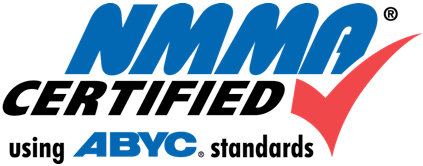 Learn More
Learn More
Watch Our Video
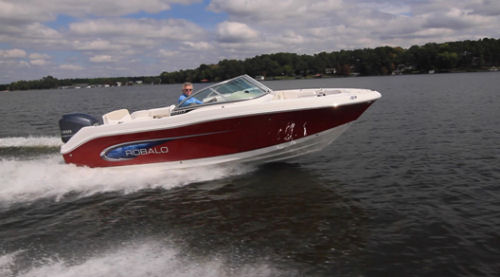
Mission Statement
The mission of the Robalo R207 is to create a cost-effective day boat that successfully bridges the crossover between fishing and family fun. Her outboard power provides a roomy cockpit while the family will appreciate the optional head compartment and her handling characteristics that encourage watersports.
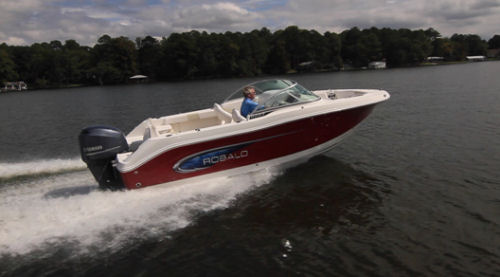
Distinguishing Features
•
Three Fishboxes.
Sometimes crossover boats neglect fishboxes, but not the R207. One is underneath and slightly behind each of the two bucket seats in the cockpit, and a third is located in the bow. They all have drains.
•
Cockpit bolsters.
Again, cockpit bolsters are something often left off dual console boats. They add to the fishing comfort.
•
Toe rails.
Likewise, toe rails that are so common on center console boats are usually left off dual console vessels. They add security for anglers in a seaway.
•
Wraparound Windshield.
With a single mullion moved far back to create a nearly unobstructed arc of visibility, the R207 is as stylish as any on the market in class.
•
Livewell.
Most dual consoles do not have a livewell as standard equipment. The R207's 13-gallon tank is located under the aft bench seat for ease of access. The interior is colored blue and all edges are rounded to reduce the shock value of the live bait. It has a directional head unit with adjustable flow valve.
•
Trailer Is Standard.
The R207 comes with an aluminum single-axle trailer which has 15" tires and submersible lights.
Performance
Our Robalo R207 had a LOA of 20'7" (6.27 m), a beam of 8'4" (2.5 m), and a draft of 14.5" (.36 m). With an empty weight of 3,400 lbs. (1,542 kgs.), 30 gallons (113.56 L) of fuel and two people on board we had a test weight of 4,000 lbs. (1,814 kg).
With a 150-hp Yamaha 4-stroke turning a 19'' Saltwater Series 2 propeller we reached a top speed at 6000 rpm of 42.2 mph. At that speed fuel burn was measured at 16 gph giving us a range of 142 miles. Best cruise came in at 3500 rpm and 24.5 mph. That reduced the fuel burn to 5.60 gph and the R207 could keep that speed up for 9 hours and 36 minutes and 205 miles while still maintaining a 10% reserve.
We had a quick time to plane of 3.8 seconds, continued accelerating to 20 mph in 5.7 seconds and we reached 30 mph in 9.2 seconds.
Handling
The R207 was a fun boat to drive. She had a firm feel thanks to the Seastar hydraulic steering, so there wasn't a lot of cranking and banking going on. That firm steering will also have an effect at the dock. Make approaches slow because cranking the wheel from one side to the next is not something that happens quickly.
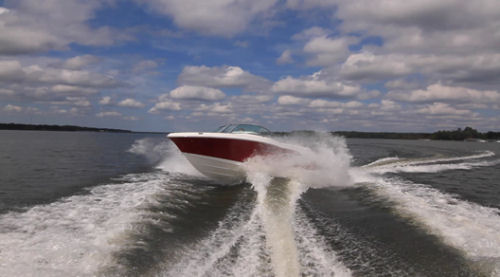
She has high topsides and a wide flared bow, qualities that would make her a good offshore boat. She also tends to throw water well out to the sides which created a very dry ride. Upon accelerating the bow comes up 11-degrees. Once on plane don't be shy about using the trim to get her onto her cruising attitude. Adding too much trim results in ventilating the propeller as opposed to generating bow oscillation.
Comparison
When I compare the R207 with other dual console 20-footers, most of which were at the high end of the price scale I discovered something quite interesting. One might think that the R207, because of her price would be stripped out and light, but it is just the opposite. At 3,400 lbs. (1,545 kgs.) she is the second heaviest boat in class that we compared no matter what the price. Typically she was 600 lbs. (272 kgs.) more than most and as much as 1,400 lbs. (636 kgs.) more than one well-known brand.
Her weight is reflective of the fishing features built-in as standard mentioned above, but also the fact that she simply has more material in her hull and deck. That is a good thing because it makes her rugged, and should also give her a more comfortable ride. On the other side of the coin it could make her a bit slower and less fuel efficient, all things being equal. But, of course, they are not…
To make up for the weight, Robalo has done two things that help the speed and fuel efficiency. First the boat has a beam of 8'4" (2.54 m) instead of 8'6" (2.59 m) and second, the boat has an 18-degree deadrise at the transom instead of 19-degrees which is typical among the boats that I checked.
Also, the R207 is limited to 200-hp max and some other boats in class are rated up to 250-hp. But the name of Robalo's game is not speed, but rather lower operating costs.
Features Walkthrough
Stern
There are relatively large platforms to either side of the Yamaha outboard. A recessed three-step reboarding ladder is concealed under a hatch to the starboard platform. Pull-up cleats are located outside of the platform on the forward raked caprail.
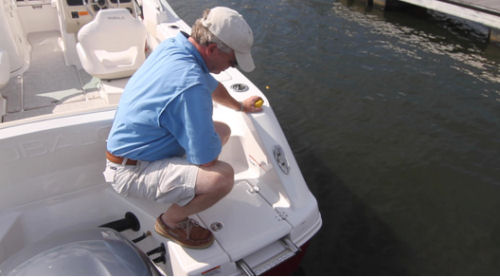
There are two things I'd like to see added to the mold. First, I would add a small platform against the transom, just ahead of the outboard, to serve as a place to stand while servicing the engine. Second, I would put a slight extension of the platform out to the sides, just behind the caprails, to ease boarding from a floating platform to the stern platform.
Cockpit
The cockpit can be entered from either the port or starboard side swim platform and is facilitated by stepping on nonskid platforms created by folding down the port and starboard jump seats. Once inside the cockpit the seats can be flipped up to create four-across seating at the aft end of the cockpit. Our test boat was also fitted with the optional snap-in carpet.
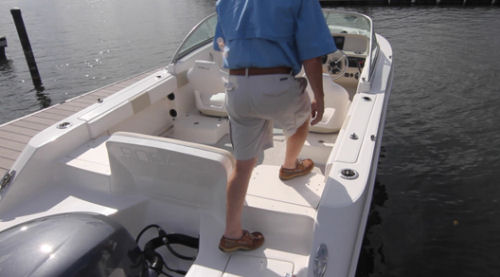
Fishing Features
As one of the primary missions of the R207 is fishing, the aft end of the cockpit is an open space measuring 3' x 6' (.9 m x 1.8 m) or 18 sq. ft.(1.7 sq m). Padded bolsters to either side make it comfortable for fighting fish. The bolsters start at 19" (48.3 cm) and top out at 25" (63.5 cm). At deck level is a toe rail for added security. The caprails are 8 1/2" (21.6 cm) wide and flush-mounted rod holders are to either side. Storage for 2 rods goes under the gunwales to either side.
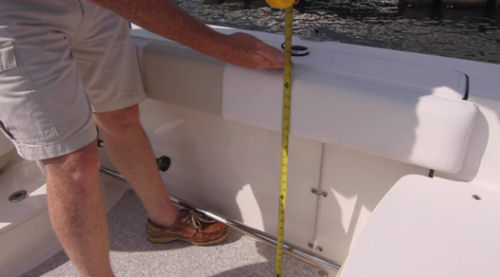
Fishboxes are in the form of two built-in self-draining cockpit coolers behind the dual bucket seats as well as a single insulated self-draining compartment in the bow. A 13 gallon (49.2 L) aerated livewell is underneath the center bench seat and the cushion is removable by sliding it sideways, which removes the pins from the hinge sockets. Certainly for fishing, this cushion as well as the cushions in the bow, can be left in the back of the pickup. A raw water washdown is standard. The entire boat, with its fully fiberglass lined cockpit, can be easily hosed down as cockpit drains lead directly overboard.
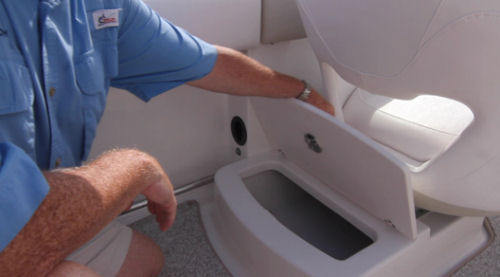
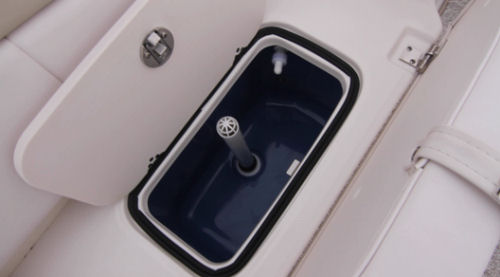
Family Features
The utility of the R207 does not extend just to fishing. A powder-coated ski tow frame surrounding the outboard is available as an option. Additional options include a wakeboard tower with a kneeboard holder.
Seating
The seating across the stern consists of two jump seats to either side of the bench seat. Under the starboard seat is the battery, fuel filter and battery switch. Under the port seat is a battery box to accommodate the optional second battery with crossover switch. Dual bucket seats are forward that swivel and slide. Ultra-comfort pedestal seats with flip-up bolsters are available for both the helm and passenger as an option. All seating and bolsters are upholstered in Dura-Life Max vinyl.
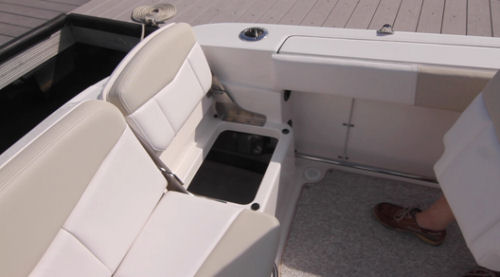
Sole Storage
Between the two bucket seats is the usual sole storage accommodation. The catch is hinged from the front and held open by a gas-assist strut. There is padding underneath the hatch as well as along the bottom of the storage compartment to protect gear. The compartment measures 18" (45.7 cm) deep and runs a full 6 ½' (1.90 m) fore and aft.
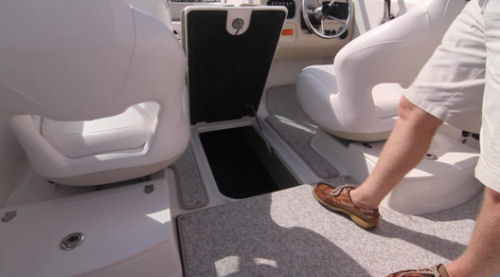
Head Console
The port console has a corner mounted door held closed by a latch and strap. Inside the door are a hanging rail, toilet paper holder, and magazine holder below. The compartment will serve as a convenient changing room, or you can opt to convert it to a head by adding the optional Porta-Potti.
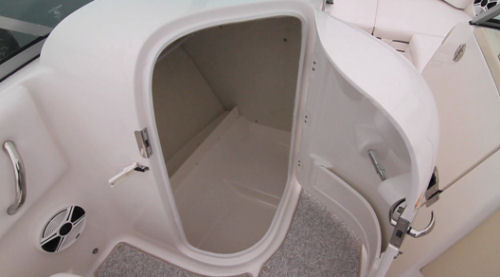
Helm Console
The helm console is completely uncluttered thanks to the use of dual optional Yamaha Command Link multi-function gauges that serve as the only information display in the panel. There's space to the right of the gauges to accommodate an optional Garmin 740S GPS. Rocker switches are below and to either side of the five-spoke stainless steel wheel mounted to a tilt base. There was plenty of leg room underneath the console and I noticed that the console was an off-white color to reduce glare. A standard compass is located at the top of the panel directly in line of sight with the helm. A stainless steel drink holder is over to the starboard side.
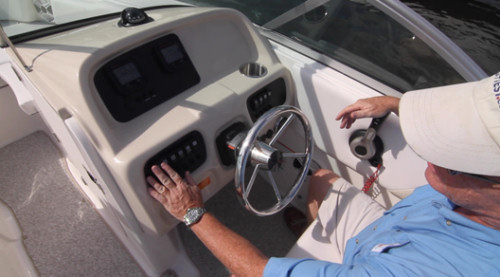
Walkthrough
Distance between the two consoles was 19" (48.3 cm) and a door on the helm console opens to also serve as an air dam below the walkthrough windshield. Behind that door is a snap-in cover over the opening to the console storage.
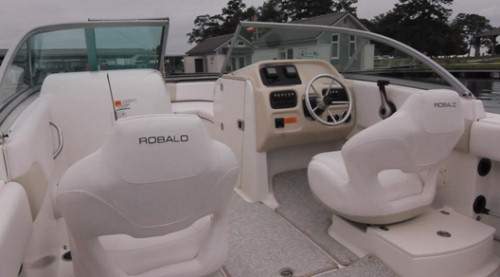
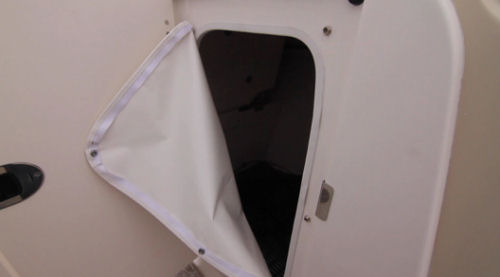
Bow
The bow was a little cramped, but serves its purpose. Sitting in the forward facing seats my legs stretched forward to the wraparound bolster. Stainless steel rails are just inside the caprails and side mounted speakers serve as the only interruption to the padded bolsters. A standard filler cushion will turn the bow into a sun lounge.
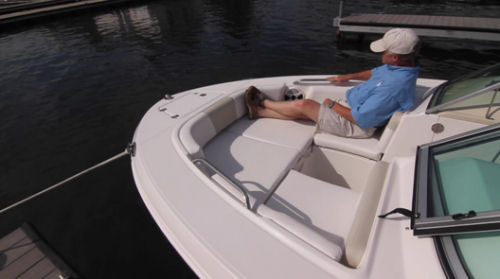
With the cushions removed, the entire bow becomes a wraparound casting platform with storage underneath the seats and a sizable fish locker under the forward hatch. The foredeck is also large enough to walk on and cast-netters will appreciate that the entire foredeck is also nonskid. A hatch at the foredeck covers an anchor locker that is self draining, anchor keepers are to either side of the opening.
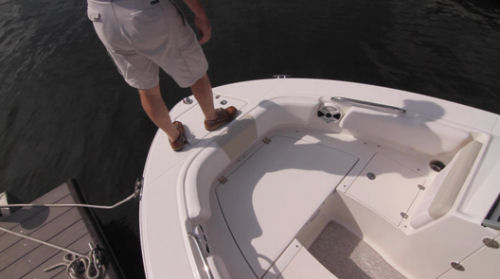
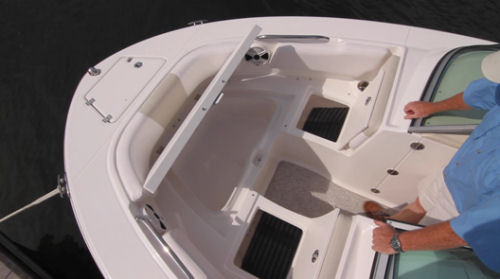
Engine Choices and Pricing
Engine options are three Yamaha 4-stroke outboards: 115-hp, 150-hp, and 200-hp. Powered by the 115-hp outboard the MSRP is $36,695. The boat sells for $39,790 with the 150, and for $43,185 with the Yamaha 200-hp engine.
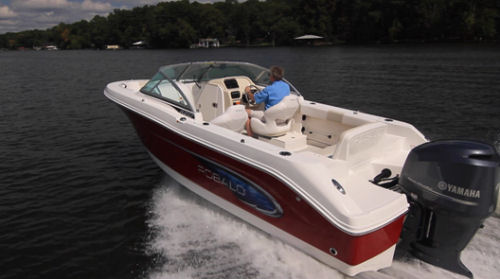
The color options are Deep Water Blue, Deep Water Black, Ice Blue and Shark Grey, all for $818.
Observations
Robalo seems to have done a good job of creating a crossover boat between fishing and family fun. The R207 is roomy enough to handle eight people and there is a seat for each one. The addition of an optional ($469) powder-coated ski tow frame can turn the R207 into a watersports platform.
I think the R207 is rigged out for fishing a little better than most dual consoles. Naturally she is slightly more oriented to fishing than to watersports given her heritage. Wiring for a trolling motor can be added for $588.
Looking over the options list I see a number of items that many people will want to put on the boat: Bimini top and boot ($1,174), hydraulic tilt steering ($175), Porta-Potti ($121), pull-up cleats ($228), dual battery system with crossover switch ($406), dual battery charger ($241), and trailer spare tire kit ($403). So for about an extra $3,000 has the boat well-outfitted for general work.
I'd probably opt for the 150-hp option, which means the total rig would have an MSRP of around under $40,000. That is a lot of boat for the money.
Source: https://boattest.com/review/robalo/2787_r207







Tidak ada komentar:
Posting Komentar